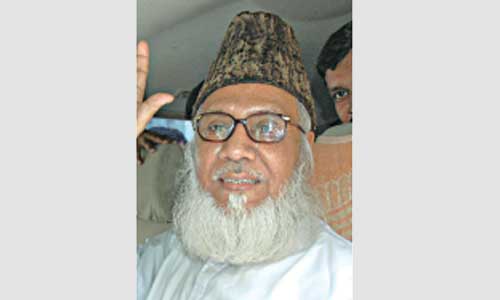NIZAMI’S APPEAL AGAINST DEATH SENTENCE : SC verdict on Jan 6
The Appellate Division said Tuesday that on January 6 it would give its decision on Jamaat chief Motiur Rahman Nizami’s appeal challenging his death sentence for war crimes.
A four-judge bench chaired by Chief Justice SK Sinha announced the schedule after hearing both the sides.
The bench included Justice Nazmun Ara Sultana, Justice Syed Mahmud Hossain and Justice Hasan Foez Siddique.
On October 29, 2014, the International Crime Tribunal-1 sentenced Nizami to death on four war crimes charges, one relating to killing intellectuals and three relating to Pabna mass killings.
He was sentenced to life terms on four other war crimes charges.
At Tuesday’s hearing, the Chief Justice expressed concern over the ICT-1 not finding Nizami guilty of four other charges of providing the incitement to kill intellectuals and mass killings in Pabna.
The charges of which he was acquitted include inciting or abetting the Al-Badr force to kill intellectuals and resort to Pabna mass killings with the inflammatory speeches he gave as the Chhatra Sangha president in the port city of Chittagong on August 3, 1971, at Khulna town on August 22, 197, on Dhaka University campus on September 8, 1971 and while addressing the Razakar force men at Jessore district town on September 10, 1971.
The Chief Justice asked Nizami’s chief defence counsel Khandker Mahbub Hossain whether the Appellate Division could re-examine the four charges on which the trial court ‘rightly’ or ‘wrongly’ acquitted Nizami though the government did not appeal against the acquittals.
Khandker Mahbub said that there was no scope to re-examining the four charges of ‘common incitements’ from which Nizami was acquitted by the tribunal after it carefully examined 26 prosecution witnesses and 203 exhibits.
He submitted that the tribunal also pointed out in its verdict, ‘On perusal of evidence on record, we find that the prosecution did not examine any witnesses to prove the charge Nos. 11 to 14 in respect of common charge of incitement. To prove the said four charges the prosecution has adduced only four pieces of newspaper clippings, Exhibit Nos. 2(5), 2 (10), 2 (15) and 2(16). Prosecution also submitted six Police Abstract Reports compiled in volume No. 09 at page Nos. 2689 to 2755. It is found on scrutiny that those reports do not disclose any element of incitement as offence.’
Khandker also submitted that the government did not challenge Nizami’s acquittal from the four charges.
The Chief Justice said that the tribunal acquitted Nizami of the charges of incitements but it could not discard the prosecution’s documentary evidence in support of his inciting speeches.
The Chief Justice said that if Nizami was found guilty of the charges of incitement or abetment, he could not escape punishment. He said the Penal Code as well as the ICT Act prescribe the same punishment to the abettor and the perpetrator.
Khandker Mahbub submitted that the charge of incitement must be direct and specific but such elements of incitements were not found in Nizami’s speeches.
Nizami delivered his speeches because of his political conviction to support undivided Pakistan as Islami Chhatra Sangha president but not as Al-Badr commander, he submitted.
He submitted that he would not say that Nizami was clean but the question is how a 20-year boy could be the commander of the Al-Badr force which was under the command of Pakistan Army, the principal perpetrators of the 1971 war crimes.
After his rebuttal, attorney general Mahbubey Alam rose to reiterate his forceful plea that as the Al-Badr force commander Nizami instigated the intellectual killings including Azharullah Huq and Abdul Alim Chowdhury, both physicians.
He referred to an article Nizami wrote under the caption, ‘Al-Badr’ published by Dainik Sangram on November 14, 1971, to mark the Al-Badr Day in support of his argument that Nizami provided the incitements to the Al-Badr forces to kill.
He argued that the apex court had no option other than upholding Nizami’s death sentence after his lawyers admitted in its hearing that being the president of Islami Chhatra Sangha he instigated his followers to eliminate Bangalis.
- See more at: http://newagebd.net/182838/nizamis-appeal-against-death-sentence-sc-verdict-on-jan-6/#sthash.gJoez02r.dpuf











